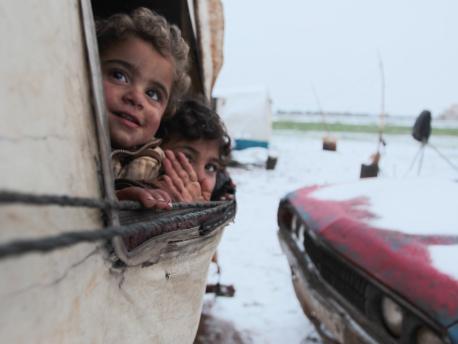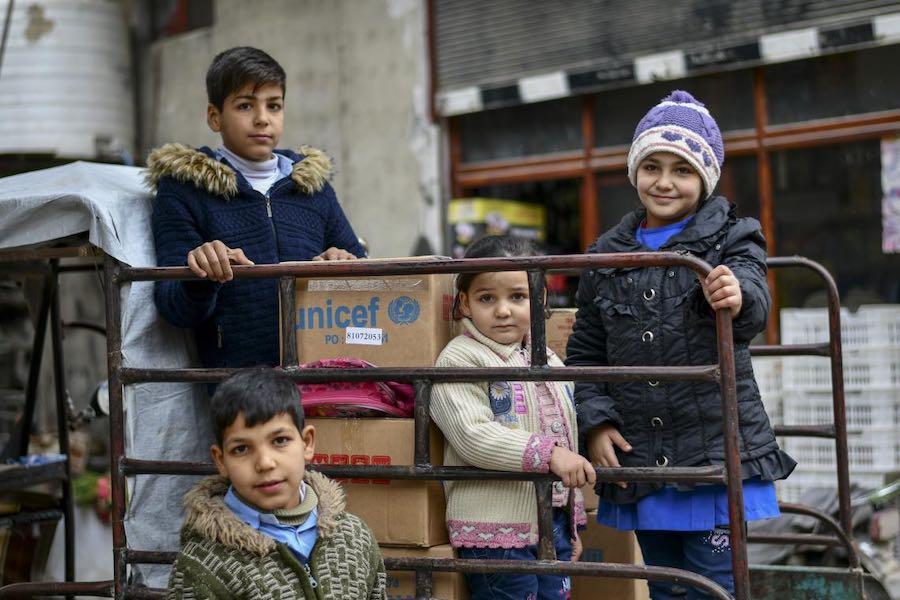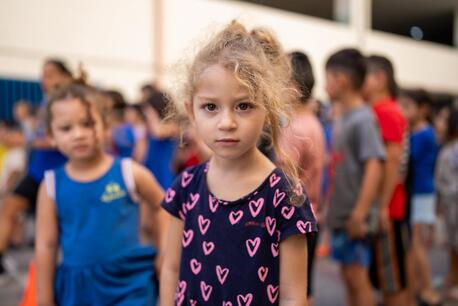
UNICEF Winter Clothes Help Syrian Children Weather the Cold
Reem (below) just got some new clothes. Like any 11-year-old with a new outfit, she can't wait to show them off.
"The first thing that I will do with my new clothes is to wear them to school," says Reem.
But unlike kids her age who live in houses with heat and electricity, Reem has another reason to be excited about her new clothes. She lives in a drafty tent in Jordan, and the warm jacket, hat and gloves delivered by UNICEF are what's going to help her withstand the cold.

The war in Syria forced Reem and her family to flee their home seven years ago. Like so many other people who have been displaced by the conflict, they have found winter a recurring threat to their survival.
In northwest Syria, where escalating violence has displaced more than 500,000 children since early December, shelter from the frigid temperatures and cold, soaking rains has been hard to find. Schools, mosques, unfinished buildings and shops offer refuge to some, but many people have no roof over their heads. Families who are camping out in parks stay warm by burning anything they can find — nylon bags, rags, firewood when they can afford it, even furniture.
“We walked for three days and now live in tents. All of our belongings were soaked with rain and mud,” says one mother from war-torn Idlib province who is now living in the Aleppo area. “I have a very sick child who needs urgent surgery, but I cannot afford it. If my child dies, all I could do is to bury him."

Since the beginning of the year, 77 children have been killed or injured in the area. The hostilities, combined with the harsh winter conditions and plummeting temperatures, have pushed thousands of children, like the boys above, to the brink. They are among around 500 displaced families from eastern Ghouta and the Idlib and Aleppo provinces now living in an informal settlement in Syria, near the Turkish border. The area was recently buffetted by snow.
UNICEF and partners are working around the clock to bring kids like them lifesaving relief. Delivering warm clothes is a priority. Although a lull in the violence has allowed some residents to return to areas like East Ghouta and Damascus, the destruction of homes leaves UNICEF winter clothes as many families' only protection from the lethal cold. UNICEF is also ensuring plentiful supplies of safe drinking water and personal hygiene products; administering vaccines; screening for malnutrition and providing treatment; enabling education; and giving children much-needed emotional support.

The children above live in rural Homs, where damage to the water infrastructure forced families to choose between rebuilding their homes and purchasing costly safe water trucked in by a private distributor. Flimsy tent walls don't keep out the cold, but UNICEF winter supplies can help. Here, kids eagerly unpack their
UNICEF winter clothes, which range from jackets, trousers, fleeces, shoes, scarves and hats for babies to all the winter gear a teen needs to make it to springtime.
UNICEF is working to help 1.7 million people — 338,000 families — survive the winter. Eight-year-old Amjad (below), who lives in Damascus, is one.

Without proper footwear, children can get sick and suffer frostbite, a risk Amjad knows only too well. He and his family live outside Damascus, 3,280 feet above sea level. Winters are extremely harsh at such high elevations, but Amjad and so many other Syrian children have nothing more than sandals to wear. “I only have slippers, so my feet are always wet which makes me feel even colder!” But thanks to the boots and shoes that came in the box of winter supplies his family received, Amjad can now play outside with his friends — as every child should.

UNICEF winter clothes make it possible for children like Amjad, who has lived his entire life during wartime, to reclaim their childhood through play. UNICEF winter supplies also give mothers peace of mind. “Since I lost my husband four years ago, life has been very difficult,” says Huda, who is raising Firas, 12, Mohammad,11, Batoul, 8, and Fatima, 3, (all above) on her own. “Receiving warm clothes for my children relieved me from a heavy burden."
Please help protect Syria's children from the cold this winter. The UNICEF Inspired Gifts collection offers winter clothing to fit children of all ages.
From top: Children peer out from a tent at a settlement for displaced families who have fled the violence in southern Idlib and rural Aleppo in northwest Syria. © UNICEF/UNI296654/Kasem, © UNICEF/Herwig, © UNICEF/UNI296658/Alshami, © UNICEF/UNI290326/Sibai, © UNICEF/UNI289865/Shahan, © UNICEF/UNI289865/Shahan.
HOW TO HELP
There are many ways to make a difference
War, famine, poverty, natural disasters — threats to the world's children keep coming. But UNICEF won't stop working to keep children healthy and safe.
UNICEF works in over 190 countries and territories — more places than any other children's organization. UNICEF has the world's largest humanitarian warehouse and, when disaster strikes, can get supplies almost anywhere within 72 hours. Constantly innovating, always advocating for a better world for children, UNICEF works to ensure that every child can grow up healthy, educated, protected and respected.
Would you like to help give all children the opportunity to reach their full potential? There are many ways to get involved.





